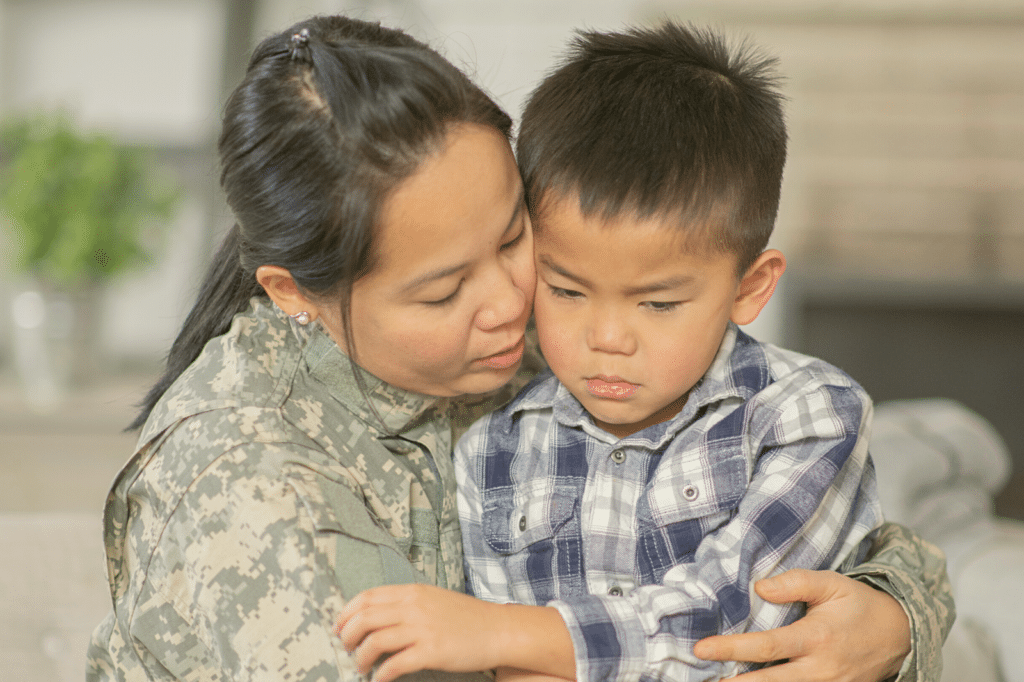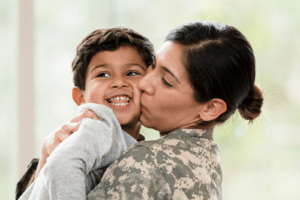Military-connected children are often aware of war at a much younger age than their peers; and experience the effects of a caregiver gone for long stretches of time to far-away places. Whether learning of conflicts occurring around the world or knowing that Mom or Dad is deployed; military children will have questions and feelings about the topic.
One of the most important things you can do when your child shares their fear and worry, is to validate the emotion rather than attempt to reassure with statements such as “There’s no need to worry” or “Don’t be afraid.” The reflex to respond in this manner often comes from a desire to protect your child from big, often undesirable feelings; however, these are well-intentioned phrases without helpful effects. I feel quite confident in betting that when you feel very worried about something, someone telling you to “not worry about it” is much easier said than done, and generally misses the mark. While it makes sense that you’d want your child to not feel worry and fear, these are natural and fitting feelings given the situation. Instead, try to name and validate the emotions, while providing reassurance that is as factual as possible and age appropriate. Examples include:
- “I know you are worried about Daddy, so am I. And I know that your Daddy has worked really hard for a long time to do his job well which helps keep him safe.”
- “I saw how nervous you looked when there was news about a war on the TV. War makes a lot of people nervous. Are you nervous about Dad going to war? Even though Dad is deployed right now, he is far away from the place on the TV. If you want, I can show you on a map how far away he is; maybe then you won’t be as nervous.”
- “I hear how scared you are about Mom while she’s deployed. It makes sense to feel scared. I also want you to know that Mom is with a lot of men and women who all look out for each other. She’s a protector and is with a whole team of protectors.”
In these examples, you’ll also note that reassurance does not include overpromising safety or that everything will be OK. As we know in the military, no one can make those promises; therefore it is best to move the focus to the facts that you can stand behind (i.e. well-trained; the importance of safety; not alone; a job that has increased safety and distance from danger).
As with any difficult topic that comes up at home, you want to consider the following points:
- Provide age-appropriate answers to questions that are as honest as appropriate
- Answer only the question at hand. If the child has additional questions, they will ask. There isn’t pressure to provide all the context that is bigger than their initial question, so it’s a good practice to keep your answers brief and focused.
- Be mindful of your own emotional reactions to topics such as war and deployment, even when you think your child isn’t paying attention. Research continues to demonstrate that when parents are calmer, children are calmer.
- It is OK to introduce new words or concepts to a child. At first, your child won’t know what a deployment is but you have the honor of teaching that word and how it is different than going to work. Remember, any word your child presently has, had to be learned at some point. Increasing their language also provides a greater sense of security as knowledge is power and comfort.
With these strategies in mind, you are not only holding space for your child during a very difficult season of military life; you are also helping their emotional development and building healthy awareness of their feelings. This will serve both you and your child well as you continue to navigate life together.










